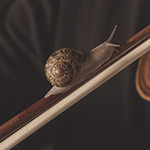Ouverture 2024 celebrates the 40th anniversary of Castello di Rivoli by creating a proposal for a 21st-century museum: rooted in Europe, but open to a broader global vision that gathers voices that have profoundly shaped the artistic discourse, drawing inspiration from principles of inclusion, social participation, and cultural engagement.
The title Ouverture intentionally references the one used for the inaugural exhibition at Castello di Rivoli, curated by its first director Rudi Fuchs and opened to the public on 19 December 1984. The exhibition was conceived as a survey of contemporary art, a proposal for a future collection, and at the same time, a model for an ideal museum. The works on display, resulting from loans or commissions, highlighted the value of the individual artistic research of the artists. The new version reactivates the same principles, but with the exceptional collection that the institution has since built. Ouverture 2024 primarily focuses on works from the collection produced since the 2000s—with some loans, as in the case of Fuchs, included as desired additions—to reaffirm the institution’s primary focus on contemporary art. The exhibition project conceived for the occasion unfolds through the two grand floors of Castello di Rivoli and traces numerous urgencies that characterise contemporary life.
On the first floor, the ecological crisis and possible forms of empathy between species are the basis of works by Ingela Ihrman, Otobong Nkanga, Anri Sala, and Roni Horn. Issues related to truth in representation and the role of images in the media-driven society are central to the research of Hito Steyerl and Pierre Huyghe. History, memory, and conflict situations define the works of Michael Rakowitz, Jennifer Allora and Guillermo Calzadilla, and Marwa Arsanios, while the darker aspects of the past are explored by Roberto Cuoghi and Chiara Fumai. The fallibility of the human body inspires Nairy Baghramian, connecting to the awareness expressed by Robert Gober through works specially loaned for the occasion.
The Ouverture 2024 journey continues on the second floor with the investigation by Cooking Sections into the relationship between food and environmental pollution, a theme further explored by Anna Boghiguian. The contrast between digital experience and the physicality of the body is addressed differently by Anne Imhof, Alexandra Sukhareva, Sara Enrico, and Ed Atkins. The consequences of colonialism are reflected in the works of Nalini Malani, Francis Offman, Maria Thereza Alves, and Zhanna Kadyrova. The themes of disappearance and absence reverberate in the research of Lara Favaretto, with a significant work loaned for the occasion, while Mario García Torres delves into the obsession with places and artistic practices of previous generations. The relationship between scientific research, imagination, and the human condition drives the works of Jenna Sutela and Micol Assaël. The exhibition path concludes in the Manica Lunga with Olafur Eliasson, whose investigation embraces the memory of the encounter with nature, the responsibility of ecological thinking, and scientific and technological experimentation.
The exhibition project marks the continuation of a journey toward the creation of an open, inclusive museum designed to engage diverse viewpoints and narratives. Ouverture 2024 aims to be a prelude to something yet to come, while being firmly rooted in what has preceded it, conceived as a journey through specific chapters of the history of Castello di Rivoli and its future, renewing its function as a device for knowledge, reflection, and personal and social growth.
Curated by Marcella Beccaria and Francesco Manacorda
Press release from Castello di Rivoli
Image: Anri Sala. If and Only If. 2018. Single channel HD video, colour, four-channel sound / two-channel HD video, colour, four-channel sound. 9 min 47 sec. Castello di Rivoli Museo d’Arte Contemporanea, Rivoli-Torino on loan from Fondazione per l’Arte Moderna e Contemporanea CRT. Image courtesy of the artist



